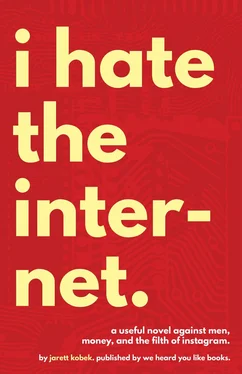Somewhere between its final piss-poor article about Weapons of Mass Destruction in Iraq and its first excellent article about Tartine, the New York Times had become the house organ of tech evangelism.
The New York Times published an awful lot of articles about Apple products. Many were about the impact of both the iPhone and the iPad.
The consensus, at the New York Times and elsewhere, was that the iPhone and iPad had changed everything.
As J. Karacehennem approached 851 Haight, he could see Adeline and Christine and a third person standing in front of the building. They were up the hill and a few blocks away.
The third person was Christine’s boyfriend Bertrand.
J. Karacehennem was thinking about apps that he might develop. He’d heard there was a lot of money in apps.
The first app would be called Jesty .
This app would make people’s iPhones unusable. Jesty would turn iPhones into bricks. Jesty would read the text of David Foster Wallace’s Infinite Jest until the iPhone owner committed suicide from the sheer weight of pretension and boredom.
The second app didn’t have a name.
It was based on a very popular app called Grindr.
Because the iPhone had changed everything, Grindr which was an app that alerted gay men to the presence of other gay men in the immediate area. Many Grindr meetings ended in furious sexual rutting. Which was a beautiful thing.
J. Karacehennem thought that since the iPhone had changed everything , surely the model of Grindr could be adapted to other situations.
He settled on the idea of an app catering to the emerging market of cross-Abrahamic relations in the Middle East.
He thought that he could build an app for Palestinians and Israelis looking to engage in consequence free violence. The app would tell a Palestinian about all the Israelis in the immediate area. The app would tell an Israeli about all the Palestinians in the immediate area.
Then Israelis and Palestinians could choose whom they wanted to meet without any messy introductions. They could choose upon whom they wanted to inflict massive, wounding violence.
The possibilities were endless. The iPhone had changed everything.
Adeline and J. Karacehennem and Christine sat in a restaurant on Church Street called Sparky’s.
Sparky’s was one of the few restaurants open in San Francisco after 10PM. They hadn’t gotten out of 851 Haight until 11pm.
“One of the very first things that Minerva told me about Sparky’s is that it was instant diarrhea,” said Adeline. “But I’m simply banned from Orphan Andy’s, aren’t I? There’s nowhere else that we might go, is there?”
So they ended up in Sparky’s.
J. Karacehennem wasn’t sure how his reading went. He’d read a poem that he’d written about North Beach.
It was titled, “ Rexroth Futurus!”
The very best part of the poem was its end:
AND IF YOU’RE IN SAN FRANCISCO
COME AND FIND ME IN THE AFTERNOON
I’LL BE AT CAFFE TRIESTE
I’M THE ONE WITHOUT ANY HAIR
SITTING NEXT TO THE GIRL
WITH NO EYEBROWS
A few months earlier, J. Karacehennem had found an old hard drive which contained all the juvenilia he’d scribbled in his teenaged years.
He opened the files and discovered that the content of this juvenilia, mostly comprised of short stories, was universally disturbing.
They were hyperviolent and betrayed the sexual anxiety of the massively unfucked. They were some of the worst fiction in the history of the English language, the products of a mind deranged by puberty.
J. Karacehennem’s teenaged self had done more than write these stories. His teenaged self had submitted them to a wide range of publications.
The old hard drive contained cover letters that he’d attached to these stories when he’d sent them to editors. They were funnier than the stories.
J. Karacehennem read the cover letters at 851 Haight.
Like the following:
February 24th, 1995
To Whom It May Concern:
Enclosed is my short story, entitled “FAT BOY”, for your consideration. It is a tale of madness, plain and not-very-simple. I realize that there are parts of the text that do not seem to make sense, but again, this is a tale of madness, and there is a connecting plot.
The story itself is 3,043 words in length.
I was pleased to hear of your magazine over the Internet. I am a new writer, who is having a hard time convincing the major fiction (and secondary) markets that my fiction is of some value. Unfortunately, most of the places I have been submitting to are more concerned with big names than writing.
For your convenience, I have enclosed a SASE. You need not return the enclosed manuscript. I look forward to hearing your reply.
Like the following:
February 9th, 1995
Dear Mister Schweitzer,
Enclosed is my short story, “Poker was the ideal game”. It is the somewhat convoluted tale of man and his love and what he does to win her back. It is a piece of good writing. I am not great and make no claims of being so. The story itself is 3,629 words in length.
I am submitting it to you, in hopes of publishing, and/or comments you might want to make. For your convenience, I have also enclosed a Self-Addressed, Stamped Envelope. The manuscript itself is not of any concern to me, and you may discard it if you deem it prudent.
A note added for you. This story has been rejected by many more mainstream fiction markets simply on the basis that it does NOT fit in with their themes. In submitting to you, I am hoping to avoid this initial prejudice.
Thank you for your time and consideration in this matter.
Adeline and Christine and J. Karacehennem were sitting in a booth by the back wall of Sparky’s.
“Darlings,” said Adeline, “Do you know that my tweeting has been rather successful? I’m up to 15,000 followers. All of these comic book fans and all the lovely young things are fascinated by the opinions of yours truly.”
“What opinions can you even express in tweets ?” asked J. Karacehennem. “Isn’t the hard limit 140 characters?”
“You’d be stunned, sweet child,” said Adeline. “For my larger exegeses, I’ve been going simply wild with the Facebook account that Jeremy set up. I’ve got about 2500 friends.”
“You were a Luddite two months ago,” said Christine.
“They put yours truly through the wringer,” said Adeline. “I decided that if other people were using me to earn their filthy lucre, then I should at the very least try and sell some books.”
“Have you affected sales?” asked Christine.
“It’s rather shocking, darling. We’ve pushed the first volume of Trill into another printing and we’ve almost sold out of the omnibus. Do you know that even Done Because We Are Too Menny is getting a second printing?”
Done Because We Are Too Menny was a solo project that Adeline published after the first inauguration of Barack Obama. She had published it with Image Comics.
The book reflected her deepening concern about global warming and climate change and the effects of overpopulation on the environment.
Overpopulation was a way of saying that the reproductive urges of the human species had spun out of control and that people could not stop creating babies.
The effect of overpopulation was to create a scarcity of resources and an economy in which selling low quality goods at high volumes was an acceptable business strategy rather than a source of shame.
Читать дальше












